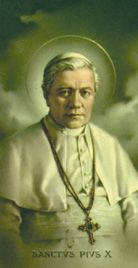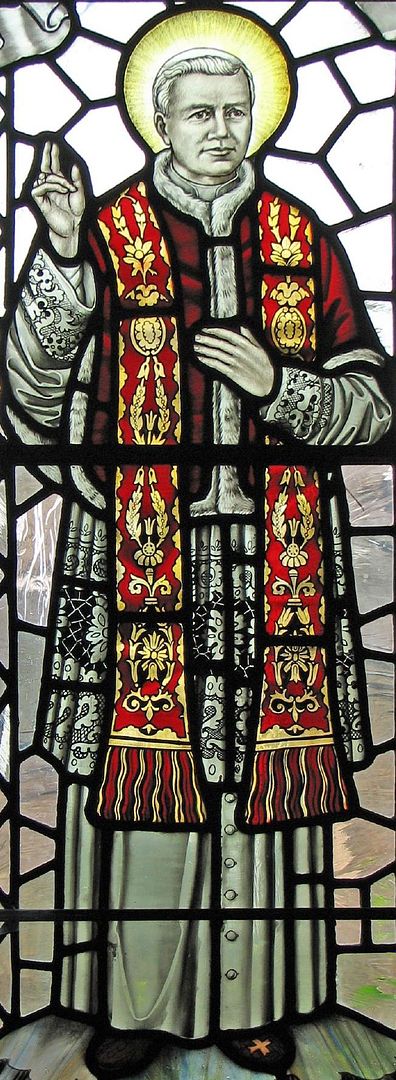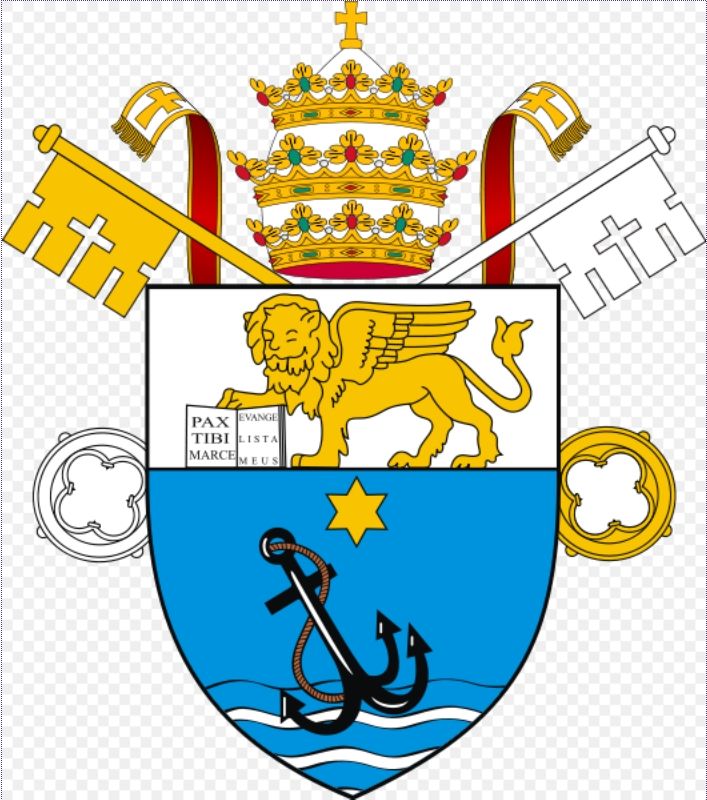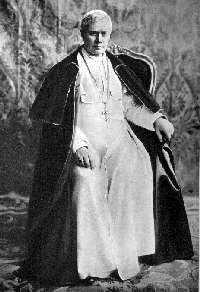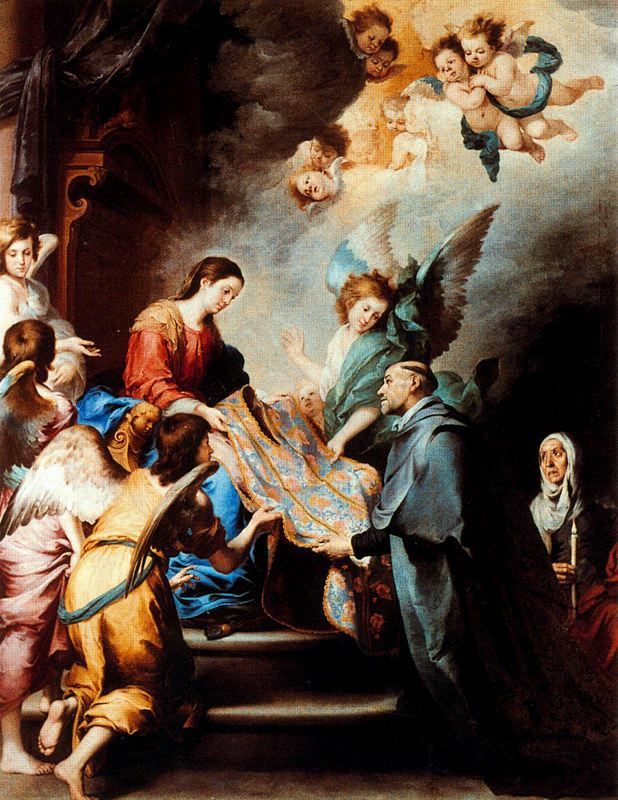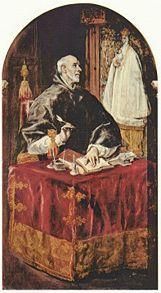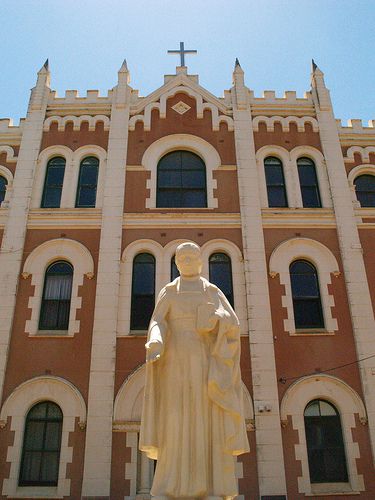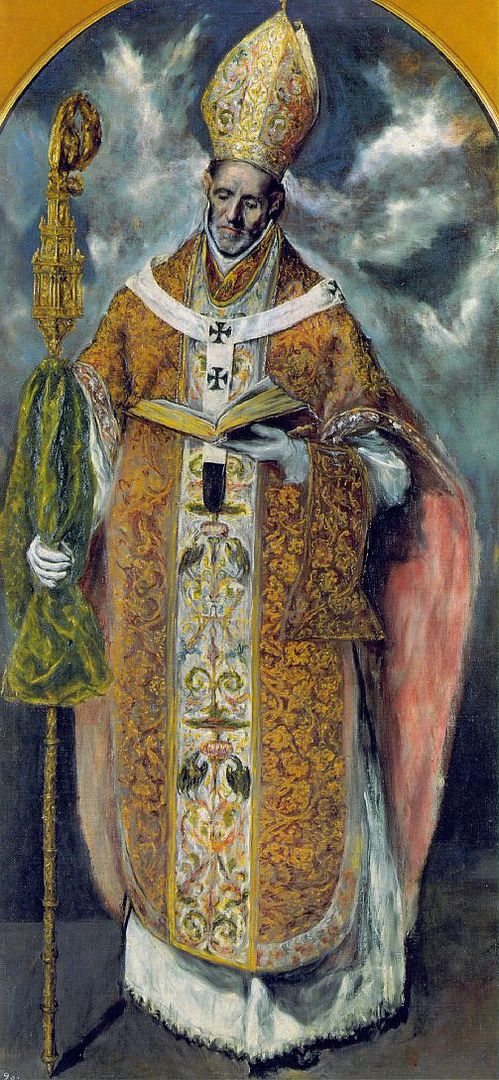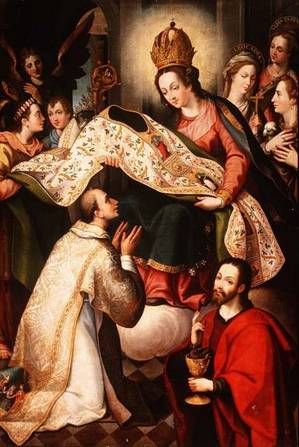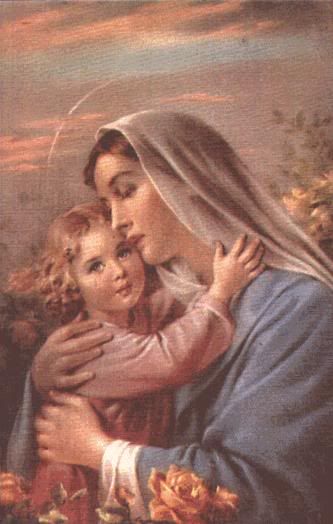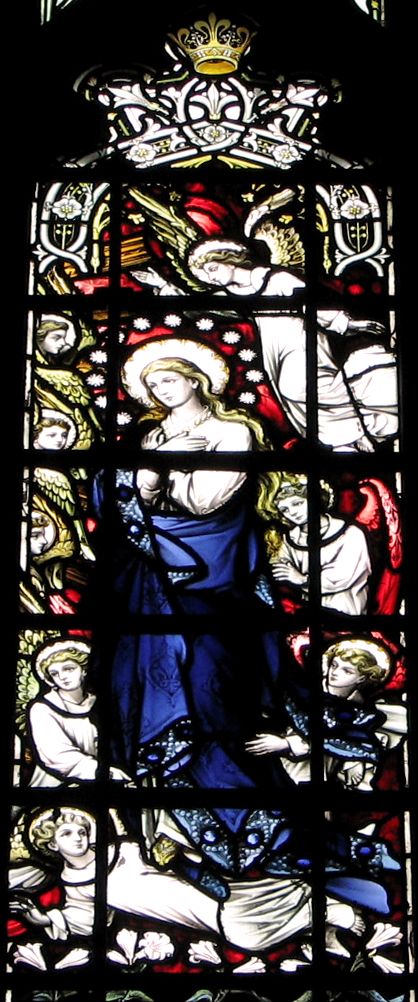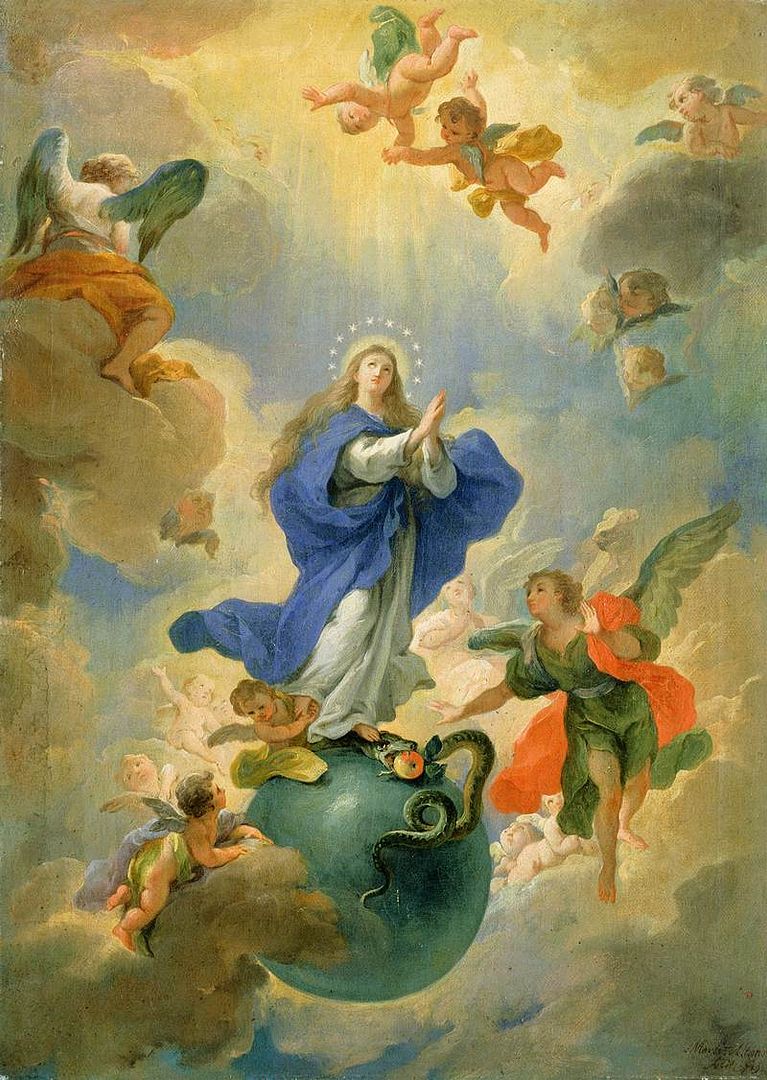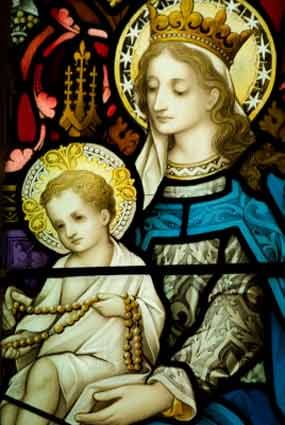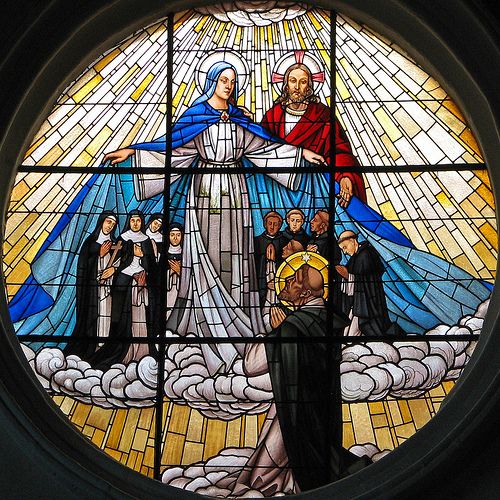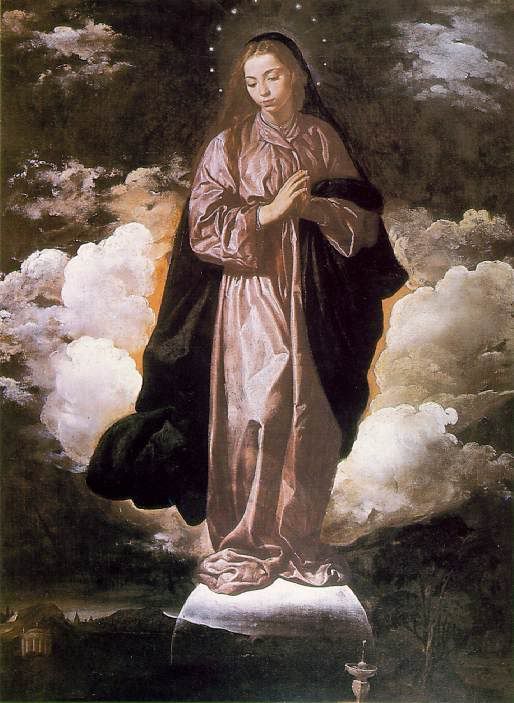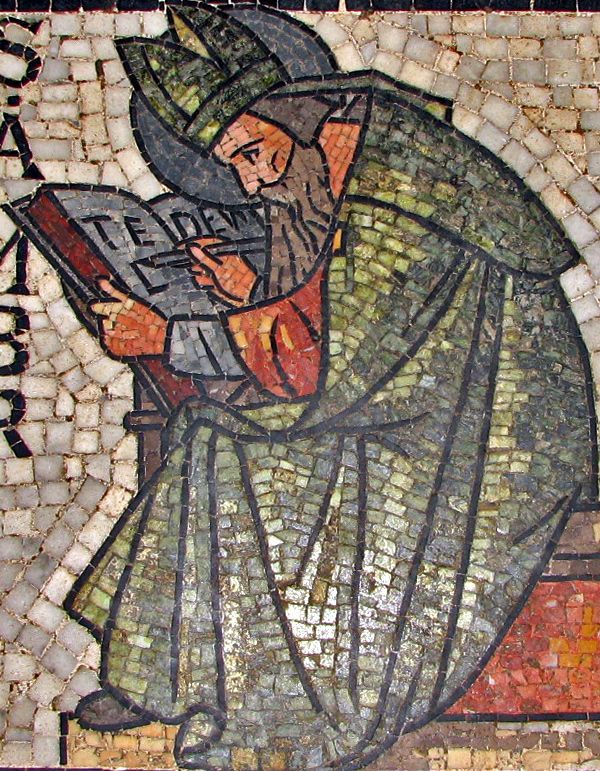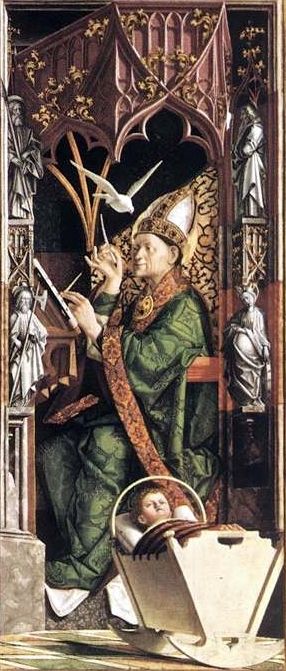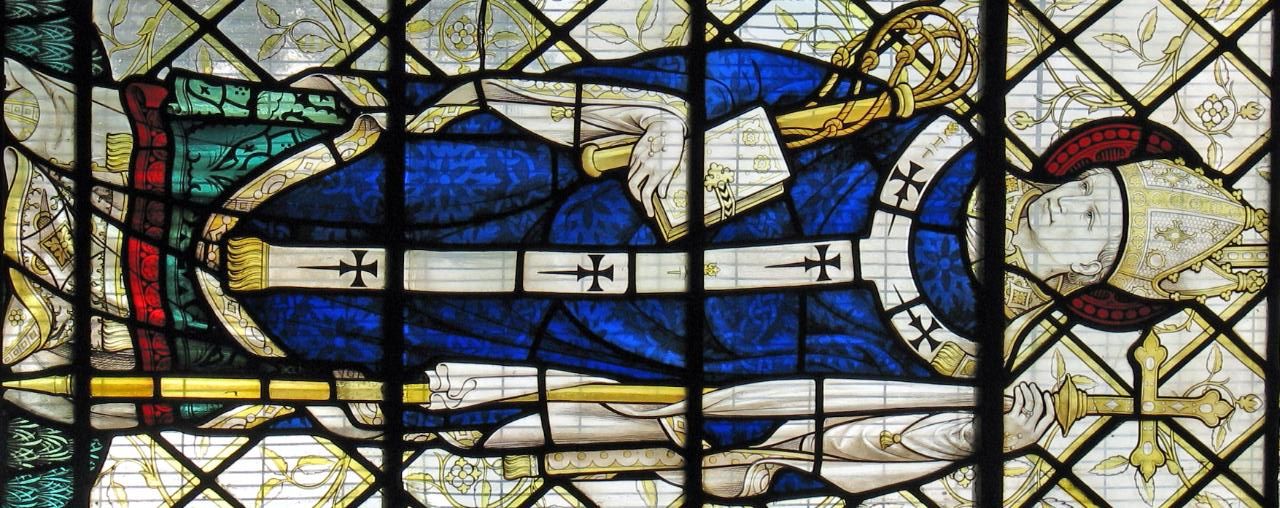“Holy Communion is the shortest and safest way to Heaven.”
Today, August 21, we celebrate the feast day of Pope Saint Pius X (1835-1914), Confessor, reformer, and the two hundred-fifty-ninth pope. Referred to as the “Pope of the Blessed Sacrament,” Pope Pius X is perhaps remembered best for his encouragement of frequent reception of the Holy Eucharist, especially for children. He urged all Catholics to look to Our Blessed Mother, and to “Restore all things in Christ” for the betterment of personal lives and of the world—a world plunged into war during his papacy. Throughout his life, Pope Pius X never forgot his humble beginnings, and lived a life of poverty, service, and humility. His last will and testament proclaims this sentiment: "I was born poor, I have lived in poverty, and I wish to die poor."
A contemporary of this great holy man, Baron von Pastor, stated of him: "He was one of those chosen few men whose personality is irresistible. Everyone was moved by his simplicity and his angelic kindness. Yet it was something more that carried him into all hearts: and that 'something' is best defined by saying that all who were ever admitted to his presence had a deep conviction of being face to face with a saint.”
Born Giuseppe Melchiorre Sarto in the small village of Reise, Venetia, the future pope experienced poverty and demonstrated humility from an early age. Giuseppe’s father was the town postman and with his mother, the couple struggled to financially support ten children. Despite their poverty, both parents highly valued education, and rather than working, Giuseppe walked six kilometers to school each day to receive his education.
As a child, Giuseppe demonstrated aptitude for learning and devotion to the Lord. He studied Latin with a local priest, and through his hard work, secured himself a scholarship to attend Seminary in Padua—something his family could not have afforded. Ordained at the age of twenty-three, he served as curate, and then labored for 17 years as a parish priest. As a priest, Giuseppe sought to prefect his knowledge of theology by assiduously studying Saint Thomas and canon law. At the same time he established a night school for adult students, and devoted himself of the ministry of preaching in other towns to which he was called. Giuseppe was elected bishop of Mantua, and in 1892 was advanced to Cardinal, and appointed to the metropolitan see of Venice with the honorary title of Patriarch. Noted for his keen intelligence, diligent work, and great piety, he was sought out for prestigious positions and advanced rapidly. Through all of his work, Giuseppe obediently answered the call of the Lord, never seeking election or promotion, but accepting that which was thrust upon him.
Giuseppe was elected Pope in 1903, taking the name Pius X, described as "a man of God who knew the unhappiness of the world and the hardships of life, and in the greatness of his heart wanted to comfort everybody." The primary goal and aim of his papacy was to “Renew all things in Christ” ("instaurare omnia in Christo"). He preached frequent reception of Holy Eucharist, a restoration of church music—including Gregorian Chant, encouraged daily Bible reading and renewal and reform of institutions to teach Biblical matters, reorganized the Roman ecclesiastical offices, and codified Canon Law—all in attempts to draw the faithful to Christ and renew the Church in His presence.
As Pope and spiritual director of the Church on earth, he displayed untiring self-sacrifice and great energy. Above all things, he defended the purity of Christian doctrine. He realized to the full the value of the liturgy as the prayer of the Church and the solid basis that it furnishes for the devotion of Christian people. He promoted sacred music so that the congregation may better participate in holy prayer, and had choir books printed for the congregation. Above all, his holiness shone forth conspicuously. From Pius X we learn again that "the folly of the Cross", simplicity of life, and humility of heart are still the highest wisdom and the indispensable conditions of a perfect Christian life, for they are the very source of all apostolic fruitfulness.
On the eleventh anniversary of his election as pope, Europe was thrust into the first World War. Taking ill with bronchitis, he wrote, “This is the last affliction the Lord will visit on me. I would gladly give my life to save my poor children from this ghastly scourge.” Pope Saint Pius X died a few days later, on August 20, 1914. His sanctity and power to work miracles had already been recognized. He was the first Pope canonized since Saint Pius V in 1672.
Selected Quotations of Pope Saint Pius X:
“Truly we are passing through disastrous times, when we may well make our own the lamentation of the Prophet: “There is no truth, and there is no mercy, and there is no knowledge of God in the land” (Hosea 4:1). Yet in the midst of this tide of evil, the Virgin Most Merciful rises before our eyes like a rainbow, as the arbiter of peace between God and man.”
“God could have given us the Redeemer of the human race, and the Founder of the Faiths in another way than through the Virgin, but since Divine Providence has been pleased that we should have the Man-God through Mary, who conceived Him by the Holy Spirit and bore Him in her womb, it only remains for us to receive Christ from the hands of Mary.”
“Sanctity alone makes us what our divine vocation demands, men crucified to the world and to whom the world has been crucified, men walking in newness of life who, in the words of St. Paul, show themselves as ministers of God in labors, in vigils, in fasting, in chastity, in knowledge, in long-suffering, in kindness, in the Holy Spirit, in sincere charity, in the word of truth; men who seek only heavenly things and strive by every means to lead others to them.”
“My hope is in Christ, who strengthens the weakest by His Divine help. I can do all in Him who strengthens me. His Power is infinite, and if I lean on him, it will be mine. His Wisdom is infinite, and if I look to Him for counsel, I shall not be deceived. His Goodness is infinite, and if my trust is stayed in Him, I shall not be abandoned.”
“Let the storm rage and the sky darken – not for that shall we be dismayed. If we trust as we should in Mary, we shall recognize in her, the Virgin Most Powerful “who with virginal foot did crush the head of the serpent.”
“The collection of psalms found in Scripture, composed as it was under divine inspiration, has, from the very beginnings of the Church, shown a wonderful power of fostering devotion among Christians as they offer “to God a continuous sacrifice of praise, the harvest of lips blessing his name.” Following a custom already established in the Old Law, the psalms have played a conspicuous part in the sacred liturgy itself, and in the divine office. Augustine expresses this well when he says: “God praised himself so that man might give him fitting praise; because God chose to praise himself man found the way in which to bless God.” The psalms have also a wonderful power to awaken in our hearts the desire for every virtue. Athanasius says: “The psalms seem to me to be like a mirror, in which the person using them can see himself, and the stirrings of his own heart; he can recite them against the background of his own emotions.” Augustine says in his Confessions: “How I wept when I heard you hymns and canticles, being deeply moved by the sweet singing of your Church. Those voices flowed into my ears, truth filtered into my heart, and from my heart surged waves of devotion.” Indeed, who could fail to be moved by those many passages in the psalms which set forth so profoundly the infinite majesty of God, his omnipotence, his justice and goodness and clemency, too deep for words, and all the other infinite qualities of his that deserve our praise? Who could fail to be roused to the same emotions by the prayers of thanksgiving to God for blessings received by the petitions, so humble and confident, for blessings still awaited, by the cries of a soul in sorrow for sin committed? Who would not be fired with love as he looks on the likeness of Christ, the redeemer, here so lovingly foretold? His was “the voice” Augustine heard in every psalm, the voice of praise, of suffering, of joyful expectation, of present distress.”
From AD DIEM ILLUM LAETISSIMUM (On the Immaculate Conception), Papal Encyclical:
10. For is not Mary the Mother of Christ? Then she is our Mother also. And we must in truth hold that Christ, the Word made Flesh, is also the Savior of mankind. He had a physical body like that of any other man: and again as Savior of the human family, he had a spiritual and mystical body, the society, namely, of those who believe in Christ. "We are many, but one sole body in Christ" (Rom. xii., 5). Now the Blessed Virgin did not conceive the Eternal Son of God merely in order that He might be made man taking His human nature from her, but also in order that by means of the nature assumed from her He might be the Redeemer of men. For which reason the Angel said to the Shepherds: "To-day there is born to you a Savior who is Christ the Lord" (Luke ii., 11). Wherefore in the same holy bosom of his most chaste Mother Christ took to Himself flesh, and united to Himself the spiritual body formed by those who were to believe in Him. Hence Mary, carrying the Savior within her, may be said to have also carried all those whose life was contained in the life of the Savior. Therefore all we who are united to Christ, and as the Apostle says are members of His body, of His flesh, and of His bones (Ephes. v., 30), have issued from the womb of Mary like a body united to its head. Hence, though in a spiritual and mystical fashion, we are all children of Mary, and she is Mother of us all. Mother, spiritually indeed, but truly Mother of the members of Christ, who are we (S. Aug. L. de S. Virginitate, c. 6).
11. If then the most Blessed Virgin is the Mother at once of God and men, who can doubt that she will work with all diligence to procure that Christ, Head of the Body of the Church (Coloss. i., 18), may transfuse His gifts into us, His members, and above all that of knowing Him and living through Him (I John iv., 9)?
12. Moreover it was not only the prerogative of the Most Holy Mother to have furnished the material of His flesh to the Only Son of God, Who was to be born with human members (S. Bede Ven. L. Iv. in Luc. xl.), of which material should be prepared the Victim for the salvation of men; but hers was also the office of tending and nourishing that Victim, and at the appointed time presenting Him for the sacrifice. Hence that uninterrupted community of life and labors of the Son and the Mother, so that of both might have been uttered the words of the Psalmist “My life is consumed in sorrow and my years in groans" (Ps xxx., 11). When the supreme hour of the Son came, beside the Cross of Jesus there stood Mary His Mother, not merely occupied in contemplating the cruel spectacle, but rejoicing that her Only Son was offered for the salvation of mankind, and so entirely participating in His Passion, that if it had been possible she would have gladly borne all the torments that her Son bore (S. Bonav. 1. Sent d. 48, ad Litt. dub. 4). And from this community of will and suffering between Christ and Mary she merited to become most worthily the Reparatrix of the lost world (Eadmeri Mon. De Excellentia Virg. Mariae, c. 9) and Dispensatrix of all the gifts that Our Savior purchased for us by His Death and by His Blood.
13. It cannot, of course, be denied that the dispensation of these treasures is the particular and peculiar right of Jesus Christ, for they are the exclusive fruit of His Death, who by His nature is the mediator between God and man. Nevertheless, by this companionship in sorrow and suffering already mentioned between the Mother and the Son, it has been allowed to the august Virgin to be the most powerful mediatrix and advocate of the whole world with her Divine Son (Pius IX. Ineffabilis). The source, then, is Jesus Christ "of whose fullness we have all received" (John i., 16), "from whom the whole body, being compacted and fitly joined together by what every joint supplieth, according to the operation in the measure of every part, maketh increase of the body unto the edifying of itself in charity" (Ephesians iv., 16). But Mary, as St. Bernard justly remarks, is the channel (Serm. de temp on the Nativ. B. V. De Aquaeductu n. 4); or, if you will, the connecting portion the function of which is to join the body to the head and to transmit to the body the influences and volitions of the head - We mean the neck. Yes, says St. Bernardine of Sienna, "she is the neck of Our Head, by which He communicates to His mystical body all spiritual gifts" (Quadrag. de Evangel. aetern. Serm. x., a. 3, c. iii.).
14. We are then, it will be seen, very far from attributing to the Mother of God a productive power of grace - a power which belongs to God alone. Yet, since Mary carries it over all in holiness and union with Jesus Christ, and has been associated by Jesus Christ in the work of redemption, she merits for us de congruo, in the language of theologians, what Jesus Christ merits for us de condigno, and she is the supreme Minister of the distribution of graces. Jesus "sitteth on the right hand of the majesty on high" (Hebrews i. b.). Mary sitteth at the right hand of her Son - a refuge so secure and a help so trusty against all dangers that we have nothing to fear or to despair of under her guidance, her patronage, her protection. (Pius IX. in Bull Ineffabilis).
Glorious Pope of the Eucharist, Saint Pius X, you sought "to restore all things in Christ." Obtain for me a true love of Jesus so that I may live only for Him. Help me to acquire a lively fervor and a sincere will to strive for sanctity of life, and that I may avail myself of the riches of the Holy Eucharist in sacrifice and sacrament. By your love for Mary, mother and queen of all, inflame my heart with tender devotion to her.
Blessed model of the priesthood, obtain for us holy, dedicated priests, and increase vocations to the religious life. Dispel confusion and hatred and anxiety, and incline our hearts to peace and concord. so that all nations will place themselves under the sweet reign of Christ. Amen.
Saint Pius X, pray for me.
Father,
to defend the Catholic faith
and to make all things new in Christ,
You filled St. Pius X
with heavenly wisdom and apostolic courage.
May his example and teaching
lead us to the reward of eternal life.
Grant this through our Lord Jesus Christ, Your Son,
who lives and reigns with You and the Holy Spirit,
one God, for ever and ever. Amen.
Why pray the Rosary every day for a year?
Each time the Blessed Virgin has appeared-- whether it be to Saint Bernadette Soubirous at Lourdes; to Lucia, Jacinta, and Francisco at Fatima; or to Mariette Beco at Banneux-- she has asserted the importance, saving grace, and power of praying the Holy Rosary on a daily basis. Based upon her words, the Rosary is penance and conversion for sinners, a pathway to peace, an end to war, and a powerful act of faith in Jesus Christ. Pope Paul VI presented the Rosary as a powerful means to reach Christ "not merely with Mary but indeed, insofar as this is possible to us, in the same way as Mary, who is certainly the one who thought about Him more than anyone else has ever done."
To show us how this is done, perhaps no one has been more eloquent than the great Cardinal Newman, who wrote: "The great power of the Rosary consists in the fact that it translates the Creed into Prayer. Of course, the Creed is already in a certain sense a prayer and a great act of homage towards God, but the Rosary brings us to meditate again on the great truth of His life and death, and brings this truth close to our hearts. Even Christians, although they know God, usually fear rather than love Him. The strength of the Rosary lies in the particular manner in which it considers these mysteries, since all our thinking about Christ is intertwined with the thought of His Mother, in the relations between Mother and Son; the Holy Family is presented to us, the home in which God lived His infinite love."
As Mary said at Fatima, "Jesus wants to use you to make Me known and loved. He wishes to establish the devotion to My Immaculate Heart throughout the world. I promise salvation to whoever embraces it; these souls will be dear to God, like flowers put by Me to adorn his throne."

“O Lord, give me the fire that you sent forth when coming on earth. Enable me to be aflame with the ardor of charity, to glow with the splendor of obedience, and to grow ardent with love. Help me to be saved from destruction amid dangers, to escape all perils, and to hasten toward Your goodness. Grant me to come peacefully into Your presence, to be satiated forever by its manifestation, and to praise You unceasingly for all eternity.”
Today, January 23, we celebrate the feast of Saint Ildephonsus of Toledo (607-667), Doctor of the Virginity of Mary, Archbishop of Toledo, and recipient of a blessed priestly vestment from Our Blessed Mother, in reward for his zeal and love for her. Saint Ildephonsus is highly venerated in Spain, and considered a precursor in establishing the later official Vatican doctrine of the perpetual virginity of Our Blessed Mother. He was the first to establish the feast of the Expectation of the Blessed Virgin Mary.
Ildephonsus was born to a noble and distinguished family in Toledo, Spain. He was the nephew of Saint Eugenius, who proceeded him as Bishop of Toledo, and a pupil of Saint Isidore of Seville. While very young, he entered the Benedictine monastery at Agalia, much against the wishes of his father. He embraced the monastic life, being ordained a deacon at the age of 23, and later becoming Abbot of the monastery. Eventually, following his attendance at the Councils of Toledo in 653 and 655, King Reccesyinth selected him to succeed Saint Eugenius as Archbishop of Toledo. It was in this capacity that he served the city and it’s inhabitants for nine years, performing his duties with diligence and sanctity until his death.
Saint Ildephonsus is a favorite saint of medieval artists, hymnographers, and poets, largely due to two famed events which occurred during his life. In one occasion, Saint Ildephonsus was praying before the relics of Saint Leocadia. It is said that during his prayers, the martyred saint rose from her grave, thanking him for the devotion he showed towards the Blessed Virgin Mary.
On a separate occasion, Our Blessed Mother herself appeared to Saint Ildephonsus, presenting him with a priestly vestment in thanks for his devotion to her. On the feast of the Mother of God, Ildephonsus and the clergy found the church engulfed in a radiant light upon arriving to celebrate Matins. All but Ildephonsus and two deacons fled, deeply afraid. When the three entered the church, there, seated on the Archbishop’s throne, was Our Blessed Mother surrounded by choirs of angels and holy virgins. Our Blessed Mother spoke to Ildephonsus, saying: "Thou art my chaplain and faithful notary. Receive from me this chasuble, which my Son sends you from His treasury." Having said this, the Immaculate Virgin clothed Ildephonsus in the chasuble, and instructed him to wear it for the Holy Sacrifice on her festivals.
Saint Ildephonsus was also a prolific writer, and his literary works are better known than the details of his life. While only four of his works have survived, they include his treatise on the perpetual virginity of the Blessed Virgin, and an important document of the history of the Spanish Church during the first two-thirds of the seventh century, entitled Concerning Famous Men.
and to bring him into the world.
Through the Holy Spirit may I too come to know your Jesus.
Imbued with the Spirit,
Mary, you could say:
"I am the handmaid of the Lord,
be it done unto me according to your word";
in the Holy Spirit,
lowly as I am,
let me proclaim the great truths about Jesus.
In the Spirit you now adore Jesus as Lord
and look on Him as Son;
in the same spirit,
Mary, let me love your Jesus
Below, a Prayer of Saint Ildephonsus to Our Blessed Mother. Taken from his work, “On the Perpetual Virginity of the Blessed Mother,” it is one of the Church’s earliest expressions of total consecration to Mary.
The Abundance of the Sweetness of Thy Son
I come to thee, only Virgin Mother of God,
and fall prostrate before thee,
who alone didst cooperate in the Incarnation of God.
I humble myself before thee,
who alone wert found to be the Mother of my Lord.
I pray thee, who alone wert found to be the handmaid of thy Son:
obtain that my sins be wiped away;
command that I be cleansed of the wickedness of my deeds,
and, that I may love the glory of thy virtue,
reveal to me the abundance of the sweetness of thy Son.
Thou Art His Co-Worker in My Redemption
Bestow upon me the gift of proclaiming the true faith of thy Son,and of defending it.
Grant that I may cleave to God and to thee,
that I may serve thy Son and thee,
that I may be His bondsman and thine;
His, because He is my Creator,
and thine, because thou art the Mother of my Creator;
His, because He is Lord of the angelic powers,
and thine, because thou art the handmaid of the Lord of All;
His, because He is God,
and thine because thou art the Mother of God;
His, because He is my Redeemer,
and thine because thou art His co-worker in my redemption.
The Body by Which He Healed My Wounds
That which He wrought for my redemption,
verily He formed in thine own person.
That He might be my Redeemer,
He became thy Son.
That He might be the price of my ransom,
He became incarnate of thy flesh.
The Body by which He healed my wounds,
He took from thee so that He, in it, might be wounded.
The mortal Body by which He took away my death,
He took from thy mortality.
The Body by which He brought my sins to nought,
He received sinless from thee.
This nature of mine that ahead of time, in Himself,
He placed above the angels in the glory of His Father's right hand,
He assumed -- humbling Himself -- out of thine own true body.
I Am Thy Slave
Therefore, I am thy slave,
because Thy Son is my Master.
Therefore thou art my Lady,
because thou art the handmaid of my Lord.
Therefore I am the slave of the handmaid of my Lord,
because thou, my Lady, didst become the Mother of my Lord.
Therefore I have become thy slave,
because thou didst become the Mother of my Maker.
By the Holy Spirit
I pray thee, I pray thee, holy Virgin,
may I, by the Spirit through Whom thou didst give birth to Jesus,have Jesus and hold Him.
By that Spirit through Whom
thou didst conceive this same Jesus in thy flesh,
may my soul receive Jesus.
Let the Spirit gift me with the knowledge of Jesus,
this Spirit by Whom it was given Thee to bear Jesus and to give Him birth.
Let the Spirit in Whom thou didst declare thyself the handmaid of the Lord,
choosing that it should be done unto thee according to the Angel's word,
grant me to proclaim the heights of Jesus with lowliness.
To Love Jesus and to Fear Him
In the Spirit thou didst adore Jesus as thy Lord
and gaze upon Him as thy Son;
in that same Spirit may I love Him.
And may I fear this same Jesus,
with that reverence by which He, truly being God,
became subject to His parents
Today, January 23, we celebrate the feast of Saint Ildephonsus of Toledo (607-667), Doctor of the Virginity of Mary, Archbishop of Toledo, and recipient of a blessed priestly vestment from Our Blessed Mother, in reward for his zeal and love for her. Saint Ildephonsus is highly venerated in Spain, and considered a precursor in establishing the later official Vatican doctrine of the perpetual virginity of Our Blessed Mother. He was the first to establish the feast of the Expectation of the Blessed Virgin Mary.
Ildephonsus was born to a noble and distinguished family in Toledo, Spain. He was the nephew of Saint Eugenius, who proceeded him as Bishop of Toledo, and a pupil of Saint Isidore of Seville. While very young, he entered the Benedictine monastery at Agalia, much against the wishes of his father. He embraced the monastic life, being ordained a deacon at the age of 23, and later becoming Abbot of the monastery. Eventually, following his attendance at the Councils of Toledo in 653 and 655, King Reccesyinth selected him to succeed Saint Eugenius as Archbishop of Toledo. It was in this capacity that he served the city and it’s inhabitants for nine years, performing his duties with diligence and sanctity until his death.
Saint Ildephonsus is a favorite saint of medieval artists, hymnographers, and poets, largely due to two famed events which occurred during his life. In one occasion, Saint Ildephonsus was praying before the relics of Saint Leocadia. It is said that during his prayers, the martyred saint rose from her grave, thanking him for the devotion he showed towards the Blessed Virgin Mary.
On a separate occasion, Our Blessed Mother herself appeared to Saint Ildephonsus, presenting him with a priestly vestment in thanks for his devotion to her. On the feast of the Mother of God, Ildephonsus and the clergy found the church engulfed in a radiant light upon arriving to celebrate Matins. All but Ildephonsus and two deacons fled, deeply afraid. When the three entered the church, there, seated on the Archbishop’s throne, was Our Blessed Mother surrounded by choirs of angels and holy virgins. Our Blessed Mother spoke to Ildephonsus, saying: "Thou art my chaplain and faithful notary. Receive from me this chasuble, which my Son sends you from His treasury." Having said this, the Immaculate Virgin clothed Ildephonsus in the chasuble, and instructed him to wear it for the Holy Sacrifice on her festivals.
Saint Ildephonsus was also a prolific writer, and his literary works are better known than the details of his life. While only four of his works have survived, they include his treatise on the perpetual virginity of the Blessed Virgin, and an important document of the history of the Spanish Church during the first two-thirds of the seventh century, entitled Concerning Famous Men.
Marian Prayer of Saint Ildephonsus
Virgin Mary, hear my prayer:
through the Holy Spirit
you became the Mother of Jesus;
from the Holy Spirit may I too have Jesus.
Through the Holy Spirit your flesh conceived Jesus;
through the same Spirit may my soul receive Jesus.
Through the Holy Spirit you were able to know Jesus,
to possess Jesus, and to bring him into the world.
Through the Holy Spirit may I too come to know your Jesus.
Imbued with the Spirit,
Mary, you could say:
"I am the handmaid of the Lord,
be it done unto me according to your word";
in the Holy Spirit,
lowly as I am,
let me proclaim the great truths about Jesus.
In the Spirit you now adore Jesus as Lord
and look on Him as Son;
in the same spirit,
Mary, let me love your Jesus
Below, a Prayer of Saint Ildephonsus to Our Blessed Mother. Taken from his work, “On the Perpetual Virginity of the Blessed Mother,” it is one of the Church’s earliest expressions of total consecration to Mary.
The Abundance of the Sweetness of Thy Son
I come to thee, only Virgin Mother of God,
and fall prostrate before thee,
who alone didst cooperate in the Incarnation of God.
I humble myself before thee,
who alone wert found to be the Mother of my Lord.
I pray thee, who alone wert found to be the handmaid of thy Son:
obtain that my sins be wiped away;
command that I be cleansed of the wickedness of my deeds,
and, that I may love the glory of thy virtue,
reveal to me the abundance of the sweetness of thy Son.
Thou Art His Co-Worker in My Redemption
Bestow upon me the gift of proclaiming the true faith of thy Son,and of defending it.
Grant that I may cleave to God and to thee,
that I may serve thy Son and thee,
that I may be His bondsman and thine;
His, because He is my Creator,
and thine, because thou art the Mother of my Creator;
His, because He is Lord of the angelic powers,
and thine, because thou art the handmaid of the Lord of All;
His, because He is God,
and thine because thou art the Mother of God;
His, because He is my Redeemer,
and thine because thou art His co-worker in my redemption.
The Body by Which He Healed My Wounds
That which He wrought for my redemption,
verily He formed in thine own person.
That He might be my Redeemer,
He became thy Son.
That He might be the price of my ransom,
He became incarnate of thy flesh.
The Body by which He healed my wounds,
He took from thee so that He, in it, might be wounded.
The mortal Body by which He took away my death,
He took from thy mortality.
The Body by which He brought my sins to nought,
He received sinless from thee.
This nature of mine that ahead of time, in Himself,
He placed above the angels in the glory of His Father's right hand,
He assumed -- humbling Himself -- out of thine own true body.
I Am Thy Slave
Therefore, I am thy slave,
because Thy Son is my Master.
Therefore thou art my Lady,
because thou art the handmaid of my Lord.
Therefore I am the slave of the handmaid of my Lord,
because thou, my Lady, didst become the Mother of my Lord.
Therefore I have become thy slave,
because thou didst become the Mother of my Maker.
By the Holy Spirit
I pray thee, I pray thee, holy Virgin,
may I, by the Spirit through Whom thou didst give birth to Jesus,have Jesus and hold Him.
By that Spirit through Whom
thou didst conceive this same Jesus in thy flesh,
may my soul receive Jesus.
Let the Spirit gift me with the knowledge of Jesus,
this Spirit by Whom it was given Thee to bear Jesus and to give Him birth.
Let the Spirit in Whom thou didst declare thyself the handmaid of the Lord,
choosing that it should be done unto thee according to the Angel's word,
grant me to proclaim the heights of Jesus with lowliness.
To Love Jesus and to Fear Him
In the Spirit thou didst adore Jesus as thy Lord
and gaze upon Him as thy Son;
in that same Spirit may I love Him.
And may I fear this same Jesus,
with that reverence by which He, truly being God,
became subject to His parents
Today, December 8, we celebrate the feast of the Immaculate Conception of the Blessed Virgin Mary—the day on which Mary, the future Mother of God, was conceived in spotless purity of soul, free from Original Sin at her first moment of animation. Our Blessed Mother, in preparation for her role as Mother of Jesus, was granted this singular grace by God, upon the merits of Jesus. Intrinsically linked and inseparable with the purity and divinity of Our Savior, Mary, the Blessed Virgin, persisted in grace and purity, becoming the vessel of the Incarnation, the Mother of the Word of God.
Pope Benedict XVI addressed the Immaculate Conception of Mary in his General Audience on 12/8/2009. The text of his address follows:
Dear brothers and sisters!
In the heart of Christian cities, Mary constitutes a sweet and reassuring presence. In her self-effacing style, she gives everyone peace and hope during the happy and sad moments of life. In churches, chapels or the walls of buildings, a painting, mosaic or a statue stand as a remainder of the Mother’s presence, constantly watching over her children. Here too in Piazza di Spagna, Mary stands high, on guard over Rome.
What does Mary tell the city? What does her presence remind us? It reminds us that “where sin increased, grace overflowed all the more (Rom., 5:20), as the Apostle Paul wrote. She is the Immaculate Mother who tells people of our time: Do not be afraid, Jesus defeated evil, uprooted it, freeing us from his rule.
When do we need such good deeds? Every day, in the newspapers, television and radio, evil is told to us, said again, amplified, so that we get used to the most horrible things, and become desensitised. In a certain way, it poisons us, because the negative is never fully cleansed out of our system but accumulates day after day. The heart hardens and thoughts become gloomy. For this reason, the city needs Mary, whose presence speaks of God, reminds us of Grace’s victory over sin and makes us hope even in the humanly most difficult situations.
Those who invisible live or rather survive in the city. They make it to the front page of newspapers or the top of TV newscast—they are exploited until the end, for as long as the news and the images are newsworthy. Few can resist such a perverse mechanism. The city first, hides then exposes them to public scrutiny, without pity or with false pity. Everyone would like to be accepted as a person and considered as something sacred, because each human story is a sacred story that deserves the utmost of respect.
Dear brothers and sisters, we are the city! Each one of us contributes with our lives to its moral climate for better or worse. The border between good and evil runs across everyone’s heart and none of us should feel entitled to judge others. Instead, each one of us must feel duty-bound to improve ourselves. Mass media make us feel like “spectators” as if evil only touched others and that certain things could not happen to us. Instead, we are all “actors” for better or worse, and our behaviour influences others.
We often complain about air pollution, that in some parts of the city the air is unbreathable. That is true. Everyone must do his or her part to make the city a cleaner place. However, there is another kind of pollution, which the senses cannot easily perceive, but which is equally dangerous. It is the pollution of the spirit, which makes us smile less, makes us gloomier, less likely to greet one another or look into each other face . . .
The city has many faces, but sadly, collective factors lead us to forget what is behind them. All we see is the surface. People become bodies, and these bodies lose their soul, become faceless objects that can be exchanged and consumed.
Mary Immaculate helps us rediscover and defend what is inside people, because in her there is perfect transparency of soul and body. She is purity in person in the sense that the spirit, soul and body are fully coherent in her and with God’s will. Our Lady teaches us to open up to God’s action and to look at others as he does, starting with the heart, to look upon them with mercy, love, infinite tenderness, especially those who are lonely, scorned or exploited. “[W]here sins increased, grace overflows all the more.”
I want to pay tribute publicly to all those who in silence, in deeds not in words, strive to practice the Evangelical law of love which drivers the world forward. There are so many of them even here in Rome. They do not make the headlines. They are men and women of all ages, who realise that it is not worth condemning, complaining or recriminating; that it is better to respond to evil doing good; to changes things; or better, to changes people, hence improve society.”
Dear Roman friends and all of you who live in this city! Whilst we are busy in everyday tasks, let us listen to Mary’s voice. Let us hear her silent but pressing appeal. She tells each one of us that wherever sin increases, may grace overflow all the more, first in our hearts, and then in our lives! Thus, the city shall be more beautiful, more Christian and more humane.
Thank you, Holy Mother, for this message of hope. Thank you for your silent but eloquent presence in the heart of our city. Immaculate Virgin, Salus Populi Romani, pray for us!
Pope Benedict XVI addressed the Immaculate Conception of Mary in his General Audience on 12/8/2009. The text of his address follows:
Dear brothers and sisters!
In the heart of Christian cities, Mary constitutes a sweet and reassuring presence. In her self-effacing style, she gives everyone peace and hope during the happy and sad moments of life. In churches, chapels or the walls of buildings, a painting, mosaic or a statue stand as a remainder of the Mother’s presence, constantly watching over her children. Here too in Piazza di Spagna, Mary stands high, on guard over Rome.
What does Mary tell the city? What does her presence remind us? It reminds us that “where sin increased, grace overflowed all the more (Rom., 5:20), as the Apostle Paul wrote. She is the Immaculate Mother who tells people of our time: Do not be afraid, Jesus defeated evil, uprooted it, freeing us from his rule.
When do we need such good deeds? Every day, in the newspapers, television and radio, evil is told to us, said again, amplified, so that we get used to the most horrible things, and become desensitised. In a certain way, it poisons us, because the negative is never fully cleansed out of our system but accumulates day after day. The heart hardens and thoughts become gloomy. For this reason, the city needs Mary, whose presence speaks of God, reminds us of Grace’s victory over sin and makes us hope even in the humanly most difficult situations.
Those who invisible live or rather survive in the city. They make it to the front page of newspapers or the top of TV newscast—they are exploited until the end, for as long as the news and the images are newsworthy. Few can resist such a perverse mechanism. The city first, hides then exposes them to public scrutiny, without pity or with false pity. Everyone would like to be accepted as a person and considered as something sacred, because each human story is a sacred story that deserves the utmost of respect.
Dear brothers and sisters, we are the city! Each one of us contributes with our lives to its moral climate for better or worse. The border between good and evil runs across everyone’s heart and none of us should feel entitled to judge others. Instead, each one of us must feel duty-bound to improve ourselves. Mass media make us feel like “spectators” as if evil only touched others and that certain things could not happen to us. Instead, we are all “actors” for better or worse, and our behaviour influences others.
We often complain about air pollution, that in some parts of the city the air is unbreathable. That is true. Everyone must do his or her part to make the city a cleaner place. However, there is another kind of pollution, which the senses cannot easily perceive, but which is equally dangerous. It is the pollution of the spirit, which makes us smile less, makes us gloomier, less likely to greet one another or look into each other face . . .
The city has many faces, but sadly, collective factors lead us to forget what is behind them. All we see is the surface. People become bodies, and these bodies lose their soul, become faceless objects that can be exchanged and consumed.
Mary Immaculate helps us rediscover and defend what is inside people, because in her there is perfect transparency of soul and body. She is purity in person in the sense that the spirit, soul and body are fully coherent in her and with God’s will. Our Lady teaches us to open up to God’s action and to look at others as he does, starting with the heart, to look upon them with mercy, love, infinite tenderness, especially those who are lonely, scorned or exploited. “[W]here sins increased, grace overflows all the more.”
I want to pay tribute publicly to all those who in silence, in deeds not in words, strive to practice the Evangelical law of love which drivers the world forward. There are so many of them even here in Rome. They do not make the headlines. They are men and women of all ages, who realise that it is not worth condemning, complaining or recriminating; that it is better to respond to evil doing good; to changes things; or better, to changes people, hence improve society.”
Dear Roman friends and all of you who live in this city! Whilst we are busy in everyday tasks, let us listen to Mary’s voice. Let us hear her silent but pressing appeal. She tells each one of us that wherever sin increases, may grace overflow all the more, first in our hearts, and then in our lives! Thus, the city shall be more beautiful, more Christian and more humane.
Thank you, Holy Mother, for this message of hope. Thank you for your silent but eloquent presence in the heart of our city. Immaculate Virgin, Salus Populi Romani, pray for us!
Today, December 8, we celebrate the feast of the Immaculate Conception of the Blessed Virgin Mary—the day on which Mary, the future Mother of God, was conceived in spotless purity of soul, free from Original Sin at her first moment of animation. Our Blessed Mother, in preparation for her role as Mother of Jesus, was granted this singular grace by God, upon the merits of Jesus. Intrinsically linked and inseparable with the purity and divinity of Our Savior, Mary, the Blessed Virgin, persisted in grace and purity, becoming the vessel of the Incarnation, the Mother of the Word of God.
Saint Anselm, Doctor of the Church, spoke of Mary as the “New Eve.” Below a sermon in which Saint Anselm praises Our Blessed Mother as the “Mother of the Re-Created World.”
Blessed Lady, sky and stars, earth and rivers, day and night – everything that is subject to the power or use of man – rejoice that through you they are in some sense restored to their lost beauty and are endowed with inexpressible new grace. All creatures were dead, as it were, useless for men or for the praise of God, who made them. The world, contrary to its true destiny, was corrupted and tainted by the acts of men who served idols. Now all creation has been restored to life and rejoices that it is controlled and given splendor by men who believe in God.
The universe rejoices with new and indefinable loveliness. Not only does it feel the unseen presence of God himself, its Creator, it sees him openly, working and making it holy. These great blessings spring from the blessed fruit of Mary’s womb.
Through the fullness of the grace that was given you, dead things rejoice in their freedom, and those in heaven are glad to be made new. Through the Son who was the glorious fruit of your virgin womb, just souls who died before his life-giving death rejoice as they are freed from captivity, and the angels are glad at the restoration of their shattered domain.
Lady, full and overflowing with grace, all creation receives new life from your abundance. Virgin, blessed above all creatures, through your blessing all creation is blessed, not only creation from its Creator, but the Creator himself has been blessed by creation.
To Mary God gave his only-begotten Son, whom he loved as himself. Through Mary God made himself a Son, not different but the same, by nature Son of God and Son of Mary. The whole universe was created by God, and God was born of Mary. God created all things, and Mary gave birth to God. The God who made all things gave himself form through Mary, and thus he made his own creation. He who could create all things from nothing would not remake his ruined creation without Mary.
God, then, is the Father of the created world and Mary the mother of the re-created world. God is the Father by whom all things were given life, and Mary the mother through whom all things were given new life. For God begot the Son, through whom all things were made, and Mary gave birth to him as the Savior of the world. Without God’s Son, nothing could exist; without Mary’s Son, nothing could be redeemed.
Truly the Lord is with you, to whom the Lord granted that all nature should owe as much to you as to himself.
Saint Anselm, Doctor of the Church, spoke of Mary as the “New Eve.” Below a sermon in which Saint Anselm praises Our Blessed Mother as the “Mother of the Re-Created World.”
Blessed Lady, sky and stars, earth and rivers, day and night – everything that is subject to the power or use of man – rejoice that through you they are in some sense restored to their lost beauty and are endowed with inexpressible new grace. All creatures were dead, as it were, useless for men or for the praise of God, who made them. The world, contrary to its true destiny, was corrupted and tainted by the acts of men who served idols. Now all creation has been restored to life and rejoices that it is controlled and given splendor by men who believe in God.
The universe rejoices with new and indefinable loveliness. Not only does it feel the unseen presence of God himself, its Creator, it sees him openly, working and making it holy. These great blessings spring from the blessed fruit of Mary’s womb.
Through the fullness of the grace that was given you, dead things rejoice in their freedom, and those in heaven are glad to be made new. Through the Son who was the glorious fruit of your virgin womb, just souls who died before his life-giving death rejoice as they are freed from captivity, and the angels are glad at the restoration of their shattered domain.
Lady, full and overflowing with grace, all creation receives new life from your abundance. Virgin, blessed above all creatures, through your blessing all creation is blessed, not only creation from its Creator, but the Creator himself has been blessed by creation.
To Mary God gave his only-begotten Son, whom he loved as himself. Through Mary God made himself a Son, not different but the same, by nature Son of God and Son of Mary. The whole universe was created by God, and God was born of Mary. God created all things, and Mary gave birth to God. The God who made all things gave himself form through Mary, and thus he made his own creation. He who could create all things from nothing would not remake his ruined creation without Mary.
God, then, is the Father of the created world and Mary the mother of the re-created world. God is the Father by whom all things were given life, and Mary the mother through whom all things were given new life. For God begot the Son, through whom all things were made, and Mary gave birth to him as the Savior of the world. Without God’s Son, nothing could exist; without Mary’s Son, nothing could be redeemed.
Truly the Lord is with you, to whom the Lord granted that all nature should owe as much to you as to himself.
Today, December 7, we celebrate the feast day of Saint Ambrose (340-397 ), baptizer of Saint Augustine, and one of the Four Great Doctors of the Church. Saint Ambrose, the “Honey-Tongued Doctor,“ exemplifies for the faithful the truly universal character of Christianity. Fully embracing the learning, law and culture of both those who came before him, as well as that of his contemporaries, Saint Ambrose had a transcendent knowledge and perspective of the world and its activities and riches. Preaching active involvement in the events of daily life, Saint Ambrose reminds us that the true activity we must focus on is the study of the Scripture, and the transcendent freedom that we experience as a result!
Ambrose was born in Gaul, the son of a Roman prefect. As an infant, his parents witnessed a sign of the great things their child would accomplish. While he slept in his crib, bees flew into the nursery and covered his face. His horrified mother watched as they harmlessly flew in and out of his mouth, depositing their honey on his tongue. Afterwards, without harming him, they flew away, continuing so high into the air that they could no longer be seen—almost as if they were returning to heaven. His father proclaimed on that day that Ambrose would accomplish great things.
Ambrose remained with his family until the death of his father, at which time he traveled to Rome, where he received an excellent education. A gifted orator and writer, Ambrose excelled as a lawyer, was recognized for his achievements, and appointed to the position of consular prefect (governor) of two districts of Italy at age 30: Liguria and Aemilia. He grew in fortune, owning a large estate, and befriended the emperor. His life was privileged and he gained much power. Four years later, when the Archbishop of Medialanum died, disputes arose between those attempting to elect an Arian bishop and those desiring an Orthodox bishop. Ambrose, as city official, traveled to the church to resolve the dispute, well aware of the heretical controversy raging.
As was his habit, Ambrose addressed the crowd, and while he was speaking, a child suddenly cried out in a loud, clear voice, “Ambrose for bishop!” The crowd followed suit, and Ambrose (who at that moment was only a Catechumen, having recently discovered the faith), was put up for the position. For his part, knowing the youth of his faith, and overly humble, Ambrose declined the offer, considering himself unworthy (and also considering that being a bishop in those days was quite dangerous!). However, Emperor Valentinian the Elder insisted, and Ambrose dared not refuse. Baptized by an orthodox priest, Ambrose passed through all the ranks of the Church in just seven days, consecrated Bishop of Mediolanum at age 34. He dispersed all his possessions, money and property for the adornment of churches, the upkeep of orphans and the poor, and he devoted himself to a strict ascetic life. Under the direction of Saint Simplician, Ambrose became expert in Scripture and theology.
Ambrose was well-loved by his congregation, keeping a balance between strict orthodoxy, spiritual shepherding, and charitable works. He combined strictness with an uncommon kindliness, and performed miracles of healing through the grace of God. Saint Ambrose was called upon repeatedly to work against heresies, traveling far and wide, but never forgetting or neglecting his flock. As the Arian heretical sect grew in power, they demanded the basilica of Mediolanum be handed over to their power. Ambrose, politely but sternly, refused. His preaching against Arianism, in defense of orthodoxy, was deeply influential.
Ambrose, too, is known for his ransom of captives. When the Goths invaded the empire and took captives, Ambrose paid out all the money he had in ransom. Melting down the Church’s golden ornaments, he said, "It is a better thing to save souls for the Lord than to save treasures. He who sent forth his apostles without gold had not need of gold to form his Church. The Church possesses gold, not to hoard, but to scatter abroad and come to the aid of the unfortunate. Would not the Lord say to us: 'Why have you let so many needy perish of hunger? Since you had gold, you should provide for their needs'...Could we say: 'I feared to leave the temple of God without ornament.' But that which can't be bought with gold does not take its value from gold. The best way to use the gold of the Redeemer is for the redemption of those in peril."
Saint Ambrose was far more concerned for the poor than for power. He often reproached the wealthy for ignoring the poor, saying: "God created the universe in such a manner that all in common might derive their food from it, and that the earth should also be a property common to all. Why do you reject one who has the same rights over nature as you? It is not from your own goods that you give to the beggar; it is a portion of his own that you are restoring to him. The earth belongs to all. So you are paying back a debt and think you are making a gift to which you are not bound."
Saint Ambrose actively spoke out against corruption and heresy in civil matters as well. After sending a copy of his work, “Exposition of the Orthodox Faith,” he was instrumental in Emperor Gracian’s removal of pagan alters from the Senate at Rome. Saint Ambrose further publicly imposed penance on Emperor Theodosius I, for massacring innocents during wartime. As Ambrose stated, no difference existed between rulers and commoners in the eyes of the Lord, and therefore, he would treat them no differently. At his behest, the emperor was not permitted to commune at the alter until he had completed public penance for his actions.
Saint Ambrose attracted many followers to Christ—some traveling great distances. He was visited frequently be scholars from Persia and the East. The Queen of the Germanic tribes (who ironically had attacked the city on more than one occasion) requested that Ambrose instruct her in the ways of Christianity. Following his correspondence, she converted and negotiated peace with the Roman Empire.
Perhaps Saint Ambrose’s most famous pupil was Saint Augustine, also one of the great Doctors of the Church. In Saint Ambrose, Augustine found a learned man, with a firm grasp of the spiritual. His sermons were far more learned than that of other contemporaries, modeled on the rational though of contemporary thinkers and philosophers. His philosophical approach spoke directly to Saint Augustine, who Ambrose personally baptized.
Saint Ambrose died peacefully on the night of the Easter Vigil, surrounded by miracles and apparitions to those being baptized. His remains are buried beneath the main alter of the Basilica of Saint Ambrose in Mediolanum.
The legacy of Saint Ambrose lives on today in the form of his numerous writings. In dogmatic compositions he set forth the Orthodox teaching about the Holy Trinity, the Sacraments, and Repentance: “Five Books on the Faith” (De Fide); “Explication of the Symbol of the Faith” (Explanatio Symboli); “On the Incarnation” (De Incarnationis); “Three Books on the Holy Spirit” (De Spiritu Sancto); “On the Sacraments” (De Sacramento); “Two Books on Repentance” (De Paenitentia). He further wrote about morality, and the balance between knowledge of doctrine and embracing of moral precepts for all those who serve the Church (“On the Duties of the Clergy”). Saint Ambrose further reformed Church music, introducing antiphonal singing (Ambrosian Chant), and composing twelve hymns including the Te Deum.
Saint Ambrose was a firm believer and devotee to Our Blessed Mother. He maintained throughout his life and preaching the perpetual virginity of Mary, further stating that the population increased in direct proportion to the value placed on virginity. Referred to as the “Patron of the Veneration of Mary,” Saint Ambrose laid the foundation for Marian devotion and thinking in the West. He wrote: “The virgin birth is worthy of God. Which human birth would have been more worthy of God, than the one, in which the Immaculate Son of God maintained the purity of his immaculate origin while becoming human?” and “We confess, that Christ the Lord was born from a virgin, and therefore we reject the natural order of things. Because not from a man she conceived but from the Holy Spirit.”
Saint Ambrose gave up all he had to follow the call of the Lord. In his God-given gifts, he brought many to Christ and defended the orthodoxy of the true Church. Throughout his preaching and writing, Saint Ambrose reminds us of our spirit—the Spirit—which lifts us beyond this world to a higher plane of praise and communion with the Lord. We are challenged today to elevate ourselves, living the principles that Christ taught, and fully experiencing the love of our gracious God.
Selected Quotations of Saint Ambrose:
“No one heals himself by wounding another.”
“Our own evil inclinations are far more dangerous than any external enemies.”
“But if these beings angels guard you, they do so because they have been summoned by your prayers.”
“The Church of the Lord is built upon the rock of the apostles among so many dangers in the world; it therefore remains unmoved. The Church’s foundation is unshakable and firm against assaults of the raging sea. Waves lash at the Church but do not shatter it. Although the elements of this world constantly beat upon the Church with crashing sounds, the Church possesses the safest harbor of salvation for all in distress.
There is a stream which flows down on God’s saints like a torrent. There is also a rushing river giving joy to the heart that is at peace and makes for peace.
He who read much and understands much, receives his fill. He who is full, refreshes others. So Scripture says: “If the clouds are full, they will pour rain upon the earth.”
"Therefore, let your words be rivers, clean and limpid, so that you may charm the ears of people. And by the grace of your words win them over to follow your leadership. Solomon says: “The weapons of the understanding are the lips of the wise”; and in another place he says: “Let your lips be bound with wisdom.” That is, let the meaning of your words shine forth, let understanding blaze out. Let no word escape your lips in vain or be uttered without depth of meaning.”
“To avoid dissensions we should be ever on our guard, more especially with those who drive us to argue with them, with those who vex and irritate us, and who say things likely to excite us to anger. When we find ourselves in company with quarrelsome, eccentric individuals, people who openly and unblushingly say the most shocking things, difficult to put up with, we should take refuge in silence, and the wisest plan is not to reply to people whose behavior is so preposterous. Those who insult us and treat us contumeliously are anxious for a spiteful and sarcastic reply: the silence we then affect disheartens them, and they cannot avoid showing their vexation; they do all they can to provoke us and to elicit a reply, but the best way to baffle them is to say nothing, refuse to argue with them, and to leave them to chew the cud of their hasty anger. This method of bringing down their pride disarms them, and shows them plainly that we slight and despise them.”
Prayer of Saint Ambrose
O God, I who presume to invoke Thy Holy Name, stand in the presence of Thy Divine Majesty: have mercy upon me, a man: a sinner smeared by the foulness of inherent impurity; forgive the unworthy priest in whose hand this oblation is seen offered: Spare O Lord one polluted by sins: in faults the foremost, in comparison to all others, and do not enter into judgment with Thy servant, for no one living is justified in Thy sight. It is true that we are weighed down in the faults and desires of our flesh: remember, O Lord, that we are flesh and there is no other source of help than Thee. Yeah, in Thy sight not even those in Heaven are much more cleansed than we earthly humans, of whom, as the Prophet said of all our righteous acts: we are in comparison as unworthy as a menstrual rag. O Jesus Christ, let us live. O Thou Who dost not will the death of a sinner: grant forgiveness unto us whom Thou hast established in flesh, so that by penitential acts we may come to enjoy eternal life in the Heavens, through our Lord Jesus Christ Who reigneth with Thee and the Holy Spirit throughout all ages of ages. Amen.
Prayer That We May Seek God and Find Him
Lord, teach me to seek you, and reveal yourself to me when I seek you. For I cannot seek you unless you first teach me, nor find you unless you first reveal yourself to me. Let me seek you in longing and long for you in seeking. Let me find you in love, and love you in finding.
Lord,
You made Saint Ambrose an outstanding teacher of the Catholic faith
and gave him the courage of an apostle.
Raise up in Your Church more leaders after Your own heart,
to guide us with courage and wisdom.
We ask this through our Lord Jesus Christ, Your Son,
who lives and reigns with You and the Holy Spirit,
one God, for ever and ever. Amen.
Year 2: Day 341 of 365
Prayer Intentions: Spiritual Re-awakening.
Ambrose was born in Gaul, the son of a Roman prefect. As an infant, his parents witnessed a sign of the great things their child would accomplish. While he slept in his crib, bees flew into the nursery and covered his face. His horrified mother watched as they harmlessly flew in and out of his mouth, depositing their honey on his tongue. Afterwards, without harming him, they flew away, continuing so high into the air that they could no longer be seen—almost as if they were returning to heaven. His father proclaimed on that day that Ambrose would accomplish great things.
Ambrose remained with his family until the death of his father, at which time he traveled to Rome, where he received an excellent education. A gifted orator and writer, Ambrose excelled as a lawyer, was recognized for his achievements, and appointed to the position of consular prefect (governor) of two districts of Italy at age 30: Liguria and Aemilia. He grew in fortune, owning a large estate, and befriended the emperor. His life was privileged and he gained much power. Four years later, when the Archbishop of Medialanum died, disputes arose between those attempting to elect an Arian bishop and those desiring an Orthodox bishop. Ambrose, as city official, traveled to the church to resolve the dispute, well aware of the heretical controversy raging.
As was his habit, Ambrose addressed the crowd, and while he was speaking, a child suddenly cried out in a loud, clear voice, “Ambrose for bishop!” The crowd followed suit, and Ambrose (who at that moment was only a Catechumen, having recently discovered the faith), was put up for the position. For his part, knowing the youth of his faith, and overly humble, Ambrose declined the offer, considering himself unworthy (and also considering that being a bishop in those days was quite dangerous!). However, Emperor Valentinian the Elder insisted, and Ambrose dared not refuse. Baptized by an orthodox priest, Ambrose passed through all the ranks of the Church in just seven days, consecrated Bishop of Mediolanum at age 34. He dispersed all his possessions, money and property for the adornment of churches, the upkeep of orphans and the poor, and he devoted himself to a strict ascetic life. Under the direction of Saint Simplician, Ambrose became expert in Scripture and theology.
Ambrose was well-loved by his congregation, keeping a balance between strict orthodoxy, spiritual shepherding, and charitable works. He combined strictness with an uncommon kindliness, and performed miracles of healing through the grace of God. Saint Ambrose was called upon repeatedly to work against heresies, traveling far and wide, but never forgetting or neglecting his flock. As the Arian heretical sect grew in power, they demanded the basilica of Mediolanum be handed over to their power. Ambrose, politely but sternly, refused. His preaching against Arianism, in defense of orthodoxy, was deeply influential.
Ambrose, too, is known for his ransom of captives. When the Goths invaded the empire and took captives, Ambrose paid out all the money he had in ransom. Melting down the Church’s golden ornaments, he said, "It is a better thing to save souls for the Lord than to save treasures. He who sent forth his apostles without gold had not need of gold to form his Church. The Church possesses gold, not to hoard, but to scatter abroad and come to the aid of the unfortunate. Would not the Lord say to us: 'Why have you let so many needy perish of hunger? Since you had gold, you should provide for their needs'...Could we say: 'I feared to leave the temple of God without ornament.' But that which can't be bought with gold does not take its value from gold. The best way to use the gold of the Redeemer is for the redemption of those in peril."
Saint Ambrose was far more concerned for the poor than for power. He often reproached the wealthy for ignoring the poor, saying: "God created the universe in such a manner that all in common might derive their food from it, and that the earth should also be a property common to all. Why do you reject one who has the same rights over nature as you? It is not from your own goods that you give to the beggar; it is a portion of his own that you are restoring to him. The earth belongs to all. So you are paying back a debt and think you are making a gift to which you are not bound."
Saint Ambrose actively spoke out against corruption and heresy in civil matters as well. After sending a copy of his work, “Exposition of the Orthodox Faith,” he was instrumental in Emperor Gracian’s removal of pagan alters from the Senate at Rome. Saint Ambrose further publicly imposed penance on Emperor Theodosius I, for massacring innocents during wartime. As Ambrose stated, no difference existed between rulers and commoners in the eyes of the Lord, and therefore, he would treat them no differently. At his behest, the emperor was not permitted to commune at the alter until he had completed public penance for his actions.
Saint Ambrose attracted many followers to Christ—some traveling great distances. He was visited frequently be scholars from Persia and the East. The Queen of the Germanic tribes (who ironically had attacked the city on more than one occasion) requested that Ambrose instruct her in the ways of Christianity. Following his correspondence, she converted and negotiated peace with the Roman Empire.
Perhaps Saint Ambrose’s most famous pupil was Saint Augustine, also one of the great Doctors of the Church. In Saint Ambrose, Augustine found a learned man, with a firm grasp of the spiritual. His sermons were far more learned than that of other contemporaries, modeled on the rational though of contemporary thinkers and philosophers. His philosophical approach spoke directly to Saint Augustine, who Ambrose personally baptized.
Saint Ambrose died peacefully on the night of the Easter Vigil, surrounded by miracles and apparitions to those being baptized. His remains are buried beneath the main alter of the Basilica of Saint Ambrose in Mediolanum.
The legacy of Saint Ambrose lives on today in the form of his numerous writings. In dogmatic compositions he set forth the Orthodox teaching about the Holy Trinity, the Sacraments, and Repentance: “Five Books on the Faith” (De Fide); “Explication of the Symbol of the Faith” (Explanatio Symboli); “On the Incarnation” (De Incarnationis); “Three Books on the Holy Spirit” (De Spiritu Sancto); “On the Sacraments” (De Sacramento); “Two Books on Repentance” (De Paenitentia). He further wrote about morality, and the balance between knowledge of doctrine and embracing of moral precepts for all those who serve the Church (“On the Duties of the Clergy”). Saint Ambrose further reformed Church music, introducing antiphonal singing (Ambrosian Chant), and composing twelve hymns including the Te Deum.
Saint Ambrose was a firm believer and devotee to Our Blessed Mother. He maintained throughout his life and preaching the perpetual virginity of Mary, further stating that the population increased in direct proportion to the value placed on virginity. Referred to as the “Patron of the Veneration of Mary,” Saint Ambrose laid the foundation for Marian devotion and thinking in the West. He wrote: “The virgin birth is worthy of God. Which human birth would have been more worthy of God, than the one, in which the Immaculate Son of God maintained the purity of his immaculate origin while becoming human?” and “We confess, that Christ the Lord was born from a virgin, and therefore we reject the natural order of things. Because not from a man she conceived but from the Holy Spirit.”
Saint Ambrose gave up all he had to follow the call of the Lord. In his God-given gifts, he brought many to Christ and defended the orthodoxy of the true Church. Throughout his preaching and writing, Saint Ambrose reminds us of our spirit—the Spirit—which lifts us beyond this world to a higher plane of praise and communion with the Lord. We are challenged today to elevate ourselves, living the principles that Christ taught, and fully experiencing the love of our gracious God.
Selected Quotations of Saint Ambrose:
“No one heals himself by wounding another.”
“Our own evil inclinations are far more dangerous than any external enemies.”
“But if these beings angels guard you, they do so because they have been summoned by your prayers.”
“The Church of the Lord is built upon the rock of the apostles among so many dangers in the world; it therefore remains unmoved. The Church’s foundation is unshakable and firm against assaults of the raging sea. Waves lash at the Church but do not shatter it. Although the elements of this world constantly beat upon the Church with crashing sounds, the Church possesses the safest harbor of salvation for all in distress.
There is a stream which flows down on God’s saints like a torrent. There is also a rushing river giving joy to the heart that is at peace and makes for peace.
He who read much and understands much, receives his fill. He who is full, refreshes others. So Scripture says: “If the clouds are full, they will pour rain upon the earth.”
"Therefore, let your words be rivers, clean and limpid, so that you may charm the ears of people. And by the grace of your words win them over to follow your leadership. Solomon says: “The weapons of the understanding are the lips of the wise”; and in another place he says: “Let your lips be bound with wisdom.” That is, let the meaning of your words shine forth, let understanding blaze out. Let no word escape your lips in vain or be uttered without depth of meaning.”
“To avoid dissensions we should be ever on our guard, more especially with those who drive us to argue with them, with those who vex and irritate us, and who say things likely to excite us to anger. When we find ourselves in company with quarrelsome, eccentric individuals, people who openly and unblushingly say the most shocking things, difficult to put up with, we should take refuge in silence, and the wisest plan is not to reply to people whose behavior is so preposterous. Those who insult us and treat us contumeliously are anxious for a spiteful and sarcastic reply: the silence we then affect disheartens them, and they cannot avoid showing their vexation; they do all they can to provoke us and to elicit a reply, but the best way to baffle them is to say nothing, refuse to argue with them, and to leave them to chew the cud of their hasty anger. This method of bringing down their pride disarms them, and shows them plainly that we slight and despise them.”
Prayer of Saint Ambrose
O God, I who presume to invoke Thy Holy Name, stand in the presence of Thy Divine Majesty: have mercy upon me, a man: a sinner smeared by the foulness of inherent impurity; forgive the unworthy priest in whose hand this oblation is seen offered: Spare O Lord one polluted by sins: in faults the foremost, in comparison to all others, and do not enter into judgment with Thy servant, for no one living is justified in Thy sight. It is true that we are weighed down in the faults and desires of our flesh: remember, O Lord, that we are flesh and there is no other source of help than Thee. Yeah, in Thy sight not even those in Heaven are much more cleansed than we earthly humans, of whom, as the Prophet said of all our righteous acts: we are in comparison as unworthy as a menstrual rag. O Jesus Christ, let us live. O Thou Who dost not will the death of a sinner: grant forgiveness unto us whom Thou hast established in flesh, so that by penitential acts we may come to enjoy eternal life in the Heavens, through our Lord Jesus Christ Who reigneth with Thee and the Holy Spirit throughout all ages of ages. Amen.
Prayer That We May Seek God and Find Him
Lord, teach me to seek you, and reveal yourself to me when I seek you. For I cannot seek you unless you first teach me, nor find you unless you first reveal yourself to me. Let me seek you in longing and long for you in seeking. Let me find you in love, and love you in finding.
Lord,
You made Saint Ambrose an outstanding teacher of the Catholic faith
and gave him the courage of an apostle.
Raise up in Your Church more leaders after Your own heart,
to guide us with courage and wisdom.
We ask this through our Lord Jesus Christ, Your Son,
who lives and reigns with You and the Holy Spirit,
one God, for ever and ever. Amen.
Year 2: Day 341 of 365
Prayer Intentions: Spiritual Re-awakening.
Requested Intentions: Blessings upon a relationship (M); Sobriety and recovery for a son (M); Employment and successful marriage (A); Employment, healing, freedom from anxiety (T); Financial security (C); Conversion (T); Peace in difficult times at work (E); Financial security and blessings for mother and children (T); Financial security for a mother (M); Health, finances, successful marriage (A); Successful resolution of court case for son (K); Continued sobriety (N); Healing of a chronic health condition (B); Successful employment (A): Peace in a family, recovery of a niece from substance use (L); Blessings on a marriage, healing of a husband (P); For the health and recovery of sisters (B); For a daughter and granddaughter (D); Blessings on overseas employment (M); Healing of mother (L); Successful employment for husband (G); Successful employment, personal fulfillment (C); Health and recovery of ill sister (A); Resolution of legal issues; Grace and protection (E); Successful and meaningful employment (S); Restoration of a marriage (A).
Subscribe to:
Posts (Atom)












